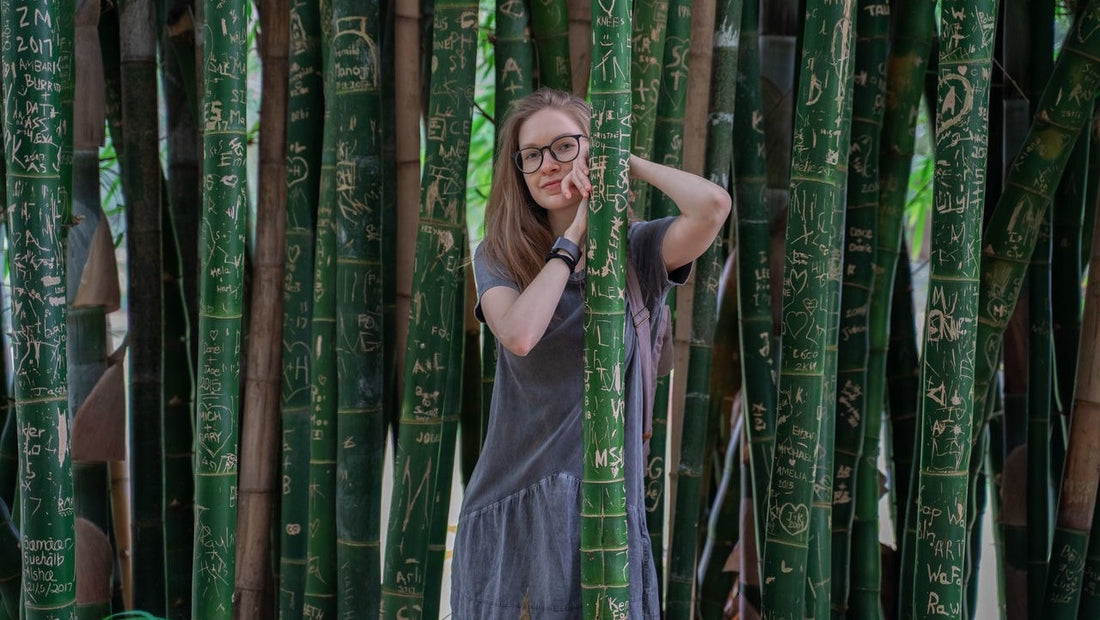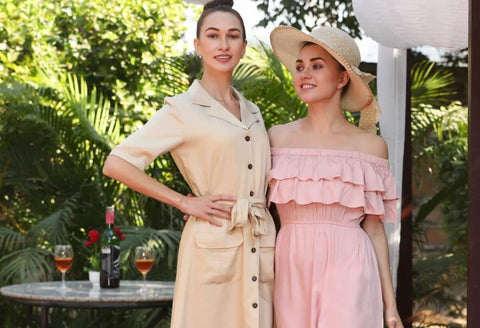
How Bamboo is leading fashion industry towards sustainable growth?
Share
The concept of sustainable fashion was averted by consumers, the consumers were turned off by the idea of sustainable fashion because it was thought that organic clothing was not fashionable or trendy, and sustainable clothes were pictured as shapeless with a burlap fabric texture, making them seem less appealing.
But currently, organic clothing is on the radar, consumers are increasingly adopting eco-friendly clothing options. The intention must be to save our mother earth or to set an example of how to be trendy when adhering to ethical fashion standards.
We are all aware that the quick fashion industry is one of the most polluting industries in the world and a significant contributor to pollution. It also has a number of disadvantages: not only does it pollute, but the products used to produce these garments have a direct effect on water use, microplastic pollution, greenhouse gas emissions, soil degradation, landfill waste, and so on. As a result, making a deliberate decision to reduce the consumption of water, microplastic pollution, greenhouse gas emissions, soil degradation, landfill waste, and so on therefore, making a conscious decision of producing and consuming organic and eco-friendly clothes is the best option.
The sustainable clothing market is now seeing huge positive growth. The manufactures and retailers are now increasing the organic fiber in the garments and some manufactures are stepping one step ahead by going for 100% organic material.
The fast fashion trend has completely changed the way people use to buy and dispose of clothing, as fast fashion is inexpensive and is widely available. Fast fashion has become a boon for fashion industries and has emerged as a dominant business.
The production of inexpensive low-quality clothes with cheap production costs has become a boon for the consumers and the producers but it has become a bane for our mother earth. The fast fashion industry is responsible for high carbon emissions, water pollution, and a large amount of landfill waste.
THE FASHION DEMANDS AND SUSTAINABLE SOLUTIONS-
As we discuss the issues related to fast fashion it is also very important to understand that the fashion industry is the vastest and it has been an important part of our society and culture. the high demand for fashion needs to get fulfilled to maintain the fashion supply chain. the global fashion industry must be environment friendly for which the fashion industries should move towards sustainable eco-friendly options.
There are a lot of eco-friendly and vegan options available in the market right now like Hemp, Wool, Organic Cotton, Soy silk, Bamboo fabrics, jute, linen, etc these are considered eco-friendly fabrics due to their availability from nature without any chemicals and harmful toxins.
These are the best eco-friendly options available in the market, the fabric obtained with these options is chemical-free as the fibers from which these fabrics are extracted do not use any pesticides or chemicals to grow and they are naturally resistant to mold and mildew.
Some of the best eco-friendly options available today are-
ORGANIC COTTON-
Organic cotton is cotton grown organically without using any synthetic chemicals, fertilizers, and pesticides .organic cotton is grown in a way that has minimum impact on the environment thus, it is an eco-friendly fabric option. The materials and the methods used in organic cotton farming reduces negative impacts on freshwater sources and also maintains the fertility of the soil.

HEMP-
Hemp is another material considered as one of the best eco-friendly fabrics it is a biodegradable fabric that is easy to grow and process, hemp fabric has a comfortable texture that is not very thick or thin and it can be worn during summer and winter both. hemp is very soft is naturally resistant to bacteria.

LINEN-
Linen is a textile made fibers extracted from the flax plant. Linen is a very strong fiber and has a very good absorbent property it dries faster than cotton. linen is comfortable to wear in hot weather and is valued for use in garments because of its absorbency and comfort, it is also antiallergic and suits every skin type perfectly.

WOOL-
Wool fabric is made from the natural fibers that come from the fleece of animals such as sheep, goats, rabbits, camels, etc, wool fabric textile is one of the most common textiles in the world. wool is 100% natural and is a very good choice from a sustainability perspective, wool is a natural product and is fully biodegradable. It breaks down quickly and returns its nutrients to the soil and it doesn't release plastic microfibers into the environment, unlike synthetic fibers.

BAMBOO-
The bamboo fabric is extracted from super soft bamboo pulp, the clothes made from bamboo are soft like silk, 100% natural, and are fully biodegradable. Bamboo makes a wonderful clothing material its fiber is hollow and thus it has unusual breathing capabilities. The bamboo fiber is crammed with micro gaps and micro holes, which allows better moisture absorption and ventilation than any other fiber. Bamboo fabrics also have unique antibacterial quality because of the presence of an antimicrobial bio-agent called "bamboo Kun" due to which the bamboo has got natural antiallergic properties.

WHY BAMBOO?
Bamboo is considered the best out of all the other sustainable options because of the following reasons-
1- Growing Organic Cotton consumes more land and water resources, some reports show that it takes 1,098 liters of water to grow enough cotton to make a t-shirt from a cotton plant, and for making the same t-shirt from organic cotton it takes 2,500 liters of water.
2- The Hemp fabric has a quite rough texture and hemp wrinkles easily and has a somewhat scratchy texture that might irritate the skin. Hemp is usually blended with other fabrics to give it a softer hand and thus the hemp clothes are quite expensive to wear.
3- Linen fabric is very eco-friendly but they are not very considerate when it comes to our pocket, Linen is a very expensive fabric and linen fabric has poor drape and elasticity and it wrinkles very easily and thus it requires a lot of care
Bamboo on the other hand is incredibly quick to grow, it does not require any chemical fertilizers and pesticides. Bamboo does not require irrigation as required by cotton. Bamboo growth is incredibly sustainable. Bamboo grows very quickly and is mature and prepared to reap after about 4 years of growth. It does not need to be replanted because its new growth is from its vast root system. It also converts a high volume of CO2 into Oxygen. Bamboo fabric also cuts out 97.5% of harmful UV rays and bamboo clothes are not very expensive like Hemp and Linen.
For many, the advantages of bamboo outweigh the drawbacks, making it the most environmentally friendly choice.
GO GREEN, ADOPT GREEN FASHION WITH BAMBOO.
